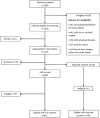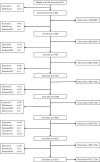Does quality of life return to pre-treatment levels five years after curative intent surgery for colorectal cancer? Evidence from the ColoREctal Wellbeing (CREW) study
- PMID: 32271835
- PMCID: PMC7145191
- DOI: 10.1371/journal.pone.0231332
Does quality of life return to pre-treatment levels five years after curative intent surgery for colorectal cancer? Evidence from the ColoREctal Wellbeing (CREW) study
Abstract
Background: The ColoREctal Wellbeing (CREW) study is the first study to prospectively recruit colorectal cancer (CRC) patients, carry out the baseline assessment pre-treatment and follow patients up over five years to delineate the impact of treatment on health and wellbeing.
Methods: CRC patients received questionnaires at baseline (pre-surgery), 3, 9, 15, 24, 36, 48 and 60 months. The primary outcome was Quality of Life in Adult Cancer Survivors (QLACS); self-efficacy, mental health, social support, affect, socio-demographics, clinical and treatment characteristics were also assessed. Representativeness was evaluated. Predictors at baseline and at 24 months of subsequent worsened quality of life (QOL) were identified using multivariable regression models.
Results: A representative cohort of 1017 non-metastatic CRC patients were recruited from 29 UK cancer centres. Around one third did not return to pre-surgery levels of QOL five years after treatment. Baseline factors associated with worsened QOL included >2 comorbidities, neoadjuvant treatment, high negative affect and low levels of self-efficacy, social support and positive affect. Predictors at 24 months included older age, low positive affect, high negative affect, fatigue and poor cognitive functioning.
Conclusions: Some risk factors for poor outcome up to five years following CRC surgery, such as self-efficacy, social support and comorbidity management, are amenable to change. Assessment of these factors from diagnosis to identify those most likely to need support in their recovery is warranted. Early intervention has the potential to improve outcomes.
Conflict of interest statement
I have read the journal’s policy and one author of this manuscript has the following competing interest: Professor Deborah Fenlon has received an honorarium for teaching from Roche. This does not alter our adherence to PLOS ONE policies and sharing data and materials.
Figures




References
-
- Ervik M, Lam F, Ferlay J, Meray L, Soerjomataram I, Bray F. Cancer Today Lyon, France: International Agency for Research on Cancer; 2016. Available from: http://gco.iarc.fr/today.
-
- Cancer Research UK. Bowel cancer survival statistics 2014. Available from: http://www.cancerresearchuk.org/health-professional/cancer-statistics/st....
-
- National Institute for Health and Care Excellence. Colorectal cancer: diagnosis and management. 2014.
Publication types
MeSH terms
LinkOut - more resources
Full Text Sources
Medical

